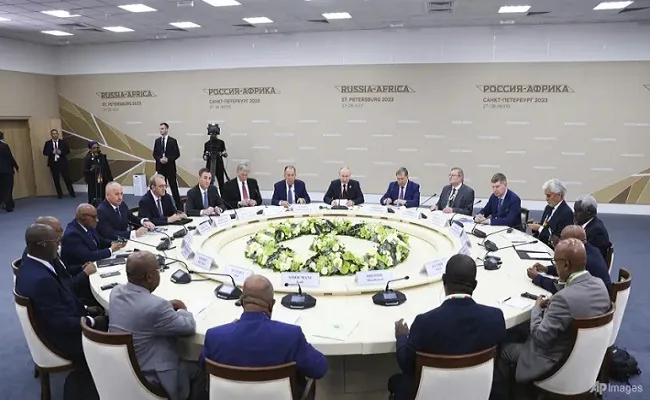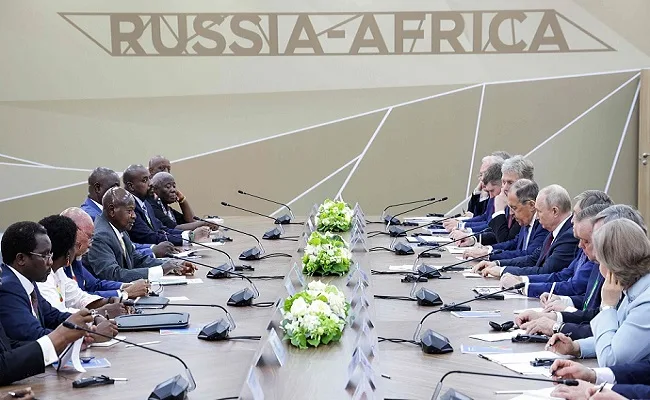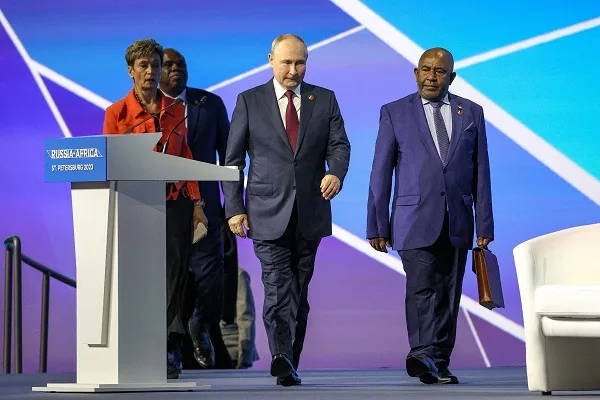Africa Pins Down Priorities at Russia-Africa Summit
The 2nd Russia-Africa Summit (#RAS2) took place in Saint Petersburg from the 27 to 28 July 2023. For the 1st edition held in Sochi, 47 African leaders were in attendance but for the 2nd edition, only 17 heads of states and governments were present. This time, many countries sent delegations which were not led by the President or Prime Minister of the country.
The Russia-Africa trade volume reached USD 22 billion for 2022, which is well below expectation, due to a challenging global environment. As far as areas of cooperation are concerned, the ties are mainly focused on agriculture, defense and mining. Actually, Russia is the largest arms supplier to Africa and Russia also exported nearly USD 5 billion of food to Africa in 2022.
“It is important to reinforce Public-Private Partnership (#PPP) to unlock the potential of the private sector, which is a key actor in the socio-economic development of Africa.”
AU Chair and Comoros President Azali Assoumi
The private sector in Africa is poised to play a critical role in the development of the continent. Currently, the private sector accounts for nearly 80% of the total production capacity of Africa, 70% of its investments, 75% of its loans and employs 90% of its labor force. The #AfCFTA is laying the foundation to unlock the entrepreneurial dynamism to pave the way for the next phase of development of Africa.
During the conference, Africa leaders outlined and reiterated their current priorities:
- Food Security
- Local Value Addition (#LVA) and Industrialization
- AU Agenda 2063
- Results-Oriented Action Plan
- Fairer Representation at Multilateral Fora
Africa is home to a population of 1.3 billion or more than 15% of the world population, yet it is still not represented on the United Nations Security Council (#UNSC). This is unfair and inequitable, and Africa calls for urgent reforms of global institutions. Africa welcomes the initiative by India, as the rotating Chair of #G20, to invite the #AU to join the grouping. In order to tackle key global issues and challenges such as #ClimateChange or #FoodSecurity, the voice and involvement of the Global South must be secured.

The Ukraine-Russia conflict has negatively impacted the world supply of cereals. Previously, Ukraine accounted for nearly 10% of wheat exports globally and was also a major producer of fertilizers. Therefore, the war has disrupted the food supply chains causing hyperinflation and even food shortage in certain severe cases. Therefore, Africa calls for an end of the Ukraine-Russia conflict via constructive engagement and negotiation to resolve the issue.
Russian President Putin pledged to supply grains free of charge to six African countries as follows: Burkina Faso, Central African Republic, Eritrea, Mali, Somali and Zimbabwe. Each country will receive 25,000 to 50,000 tonnes of grain from Russia. However, observers note that by withdrawing from the Black Sea Grain Export Deal, Russia has in fact worsened the situation.
“We must stop those countries that count their wealth and their assets in terms of minerals that reside in the African soil like they did in the past when they counted their wealth in the number of slaves that they owned, taken from the African continent.”
South African President Cyril Ramaphosa
Africa no longer wants to just export ores or other minerals but wishes to export finished goods. The current stance is for Africa to establish a reciprocal, fair and level-playing field in international trade.
All relationships under the Africa-X format should be guided by the AU #Agenda2063 which spells out the aspirations and flagship projects of the continent to realize the Africa that Africans want. African countries are sovereign states and must be able to pursue their foreign policy that is ‘not beholden to any of the major global powers or blocs.’

In that spirit, the proposed Russia-Africa Action Plan should be aligned with the 2nd Ten-Year Implementation Plan of the AU #Agenda2063. A follow-up mechanism must be put in place to take corrective measures if targets are not achieved. In that way, both sides can hopefully achieve better coherence and foster results-oriented actions.
On final day of the conference, as a gesture of goodwill, President Putin announced that Russia will write off USD 20 billion of debt for African countries. The breakdown of the debt relief is as follows: Ethiopia $5B, Libya $4.5B, Algeria $4.4B, Angola $3.5B and Angola $3.5B. In the future, Russia plans to shift from aid to investment in Africa.

